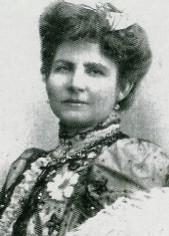Lutegarda Guimarães de Caires facts for kids
Lutgarda Guimarães de Caires (born in 1858, died in 1935) was a Portuguese woman who worked hard for women's rights and was also a poet. She is famous for starting a special Christmas tradition in Portugal. Every year, people now bring gifts like clothes, toys, and sweets to children in hospitals. Lutgarda also successfully fought to make conditions much better for women in prison. Besides her award-winning poems, she wrote articles in newspapers. In these articles, she asked for women to have the same chances as men and for their property rights to be improved.
Biography
Lutgarda Guimarães was born in Vila Real de Santo António in 1858. Her parents were María Teresa de Barros and José Rodrigues Guimarães. When Lutgarda was very young, her mother passed away. Her father lovingly took care of her and her brother. He taught them to play musical instruments like the harp, violin, and sitar.
When she was still young, Lutgarda moved from the Algarve region to Lisbon. There, she met and later married João de Caires. He was a lawyer from Madeira. João started a group called the Sociedade de Propaganda de Portugal. This group often met at their home. Guests would gather to talk about literature and other interesting topics. Lutgarda also joined these meetings.
A sad event in her life was the death of her baby daughter. This sadness inspired her to help others. She began taking clothes, toys, and sweets to children in the Hospital da Estefânia. This kind act started the Portuguese tradition of giving gifts to hospitalized children at Christmas.
From 1905, Lutgarda began writing articles for newspapers and magazines. These articles focused on important social issues. Her first book of poetry was Glicínias, published in 1910. Other popular books included Papoilas (1912) and A Dança do Destino, contos e narrativas (1913). In 1923, her poem called Florinha da Rua won first prize. This was at the Hispano-Portuguese Floral Games held in Ceuta.
In 1911, the Ministry of Justice asked her to study prison conditions. She looked closely at how prisoners lived, especially women. Because of her strong criticisms, many improvements were made in prisons.
In June 1913, Lutgarda was part of an important group. She, Ana Augusta de Castilho, Beatriz Pinheiro, Joana de Almeida Nogueira, and Maria Veleda were a Portuguese team. They attended the Seventh Conference of the International Woman Suffrage Alliance in Budapest. This conference brought together people who supported women's right to vote.
Lutgarda Guimarães de Caires passed away in Lisbon in 1935.
See also
 In Spanish: Lutegarda Guimarães de Caires para niños
In Spanish: Lutegarda Guimarães de Caires para niños
 | Aurelia Browder |
 | Nannie Helen Burroughs |
 | Michelle Alexander |


